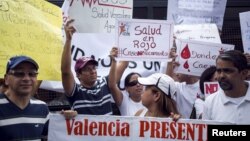Venezuelans with chronic medical conditions such as breast cancer and hemophilia protested in Caracas on Thursday, the latest demonstration to demand urgent medicines in a country whose health care system is beset with shortages.
About 13,000 people with chronic issues are at risk of severe harm if they do not take medicines such as those used in chemotherapy or to prevent rejection of organ transplants, said organizer CodeVida, a nonprofit umbrella health group.
A combination of currency controls, slumping domestic production and cross-border smuggling have caused acute shortages of medical supplies in socialist-led Venezuela. With an estimated seven in 10 drugs currently unavailable, rights groups are warning the situation is increasingly untenable.
"The word 'wait' doesn't exist for transplant patients. The medicines are daily. If we don't have them, we collapse," said Alfredo Quintero, 52, who has a transplanted kidney but has medicines to last only until Sept. 6.
"What do they want us to be, a statistic?" he said at the demonstration by a few dozen protesters outside a pharmaceutical branch that supplies free medicines.
Demonstrators brandished posters reading "S.O.S. — Venezuelan health is dying" and "We can't wait."
Earlier this month, children suffering from cancer also protested in front of a Caracas hospital about chemotherapy drug supply problems.
"In the last few months the supply of medicines for people with chronic health issues has worsened. Without these medicines we could see irreversible harm," said CodeVida director Francisco Valencia. "We're receiving calls from across the country, and we don't know what to say because we don't have medicine. The situation is critical."
Maduro points to 'war'
President Nicolas Maduro has framed shortages as part of an "economic war" led by businessmen whom he accuses of hoarding and smuggling goods. Authorities did not respond to requests for comment about Thursday's protest.
Maduro's predecessor, Hugo Chavez, harnessed an oil boom to build free clinics in the slums, and health issues such as maternal mortality improved.
But the government has stopped publishing many health statistics since shortages worsened. Now, hospitals are overloaded, doctors have left the public sector or the country, and equipment including thermometers and catheters are scarce.
About 230 breast cancer patients are currently unable to undergo surgery because of the lack of blood, said Luisa Rodriguez, president of nonprofit breast cancer group FUNCAMAMA.
"These women are going to see their tumor double in 100 days. There's a risk of death or treatment being extended unnecessarily," said Rodriguez, waving a sign listing a dozen missing medicines.









